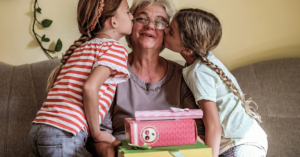[et_pb_section fb_built=”1″ _builder_version=”3.22.3″][et_pb_row _builder_version=”3.25″ background_size=”initial” background_position=”top_left” background_repeat=”repeat”][et_pb_column type=”4_4″ _builder_version=”3.25″ custom_padding=”|||” custom_padding__hover=”|||”][et_pb_text admin_label=”Maria Roxas” _builder_version=”4.7.7″ hover_enabled=”0″ sticky_enabled=”0″]
There’s no better feeling than getting a good night’s sleep. Having good sleep leaves you revitalized, rested, and ready to take on the day’s challenges. However, for many caregivers, a peaceful 7 to 9 hour sleep which is the general recommendation for most adults are often unattainable.
In fact, in a recent study published by BMC Geriatrics. They found that 94% of participants (caregivers for individuals with dementia) were sleep deprived. Identifying stress as a significant predictor of overall sleep quality.
Caregiver Stress & Sleep Deprivation
The correlation between stress and sleep deprivation is also reflected. And also highlights caregiver stress as both a cause and consequence of poor sleep.
Waking up at night can be common for people living with symptoms of dementia, which then also disrupts the sleep of caregivers.
It can also be difficult for caregivers to have time to unwind at the end of the day. Caregivers juggle multiple tasks, deal with tense situations and challenging behaviours through out the day.
Mood disorders, hypertension, mental health challenges, and a greater risk of developing long-term illnesses are all interrelated with sleep deprivation as well.
As concluded in the study, this interrelation makes it clear that “improving the sleep of caregivers may in turn improve their psychological well being.”
Better Sleep = Healthier Brain
Research into the science of sleep has proven that sleep plays an important role in the function of a healthy brain.
A state of deep sleep can literally help in cleansing the brain, as waste is removed from brain cells via the brain’s Glymphatic system.
In addition to these neurological housekeeping duties. In maintaining a good quality of sleep, it helps boost our memory, our alertness, our immune system, and sets our long-term health trajectory on the right path.
For caregivers, preventing sleep deprivation also prevents caregiver burnout. In fact, better sleep for caregivers can even lead to more individuals with dementia being able to continue living at home (instead of moving to a long-term care facility). Since family caregivers may feel better equipped to manage caregiver tasks.
Less Sleep Deprivation, More Sleep Amelioration
So, what can caregivers do to keep sleep deprivation at bay?
A healthy diet, exercise, relaxation techniques are some examples that can help. Learning deep breathing, taking breaks, and maintaining a regular bedtime, are all strategies for improving sleep. Establishing a routine for a loved one with dementia can also be vital.
It is also key that caregivers reach out for assistance and support. In-person support from other family members or a professional caregiver can help relieve stress. There are also online resources that can be accessed (especially in the age of Covid-19), such as online caregiver support groups and programs for enhancing caregiver well being.
Whether it’s deep breathing exercises or a virtual support group. If you can find ways to prevent sleep deprivation for caregivers. By understanding the importance of enhancing the well being of those who receive care. You can also enhance the well being of your caregivers.
[/et_pb_text][/et_pb_column][/et_pb_row][/et_pb_section]



